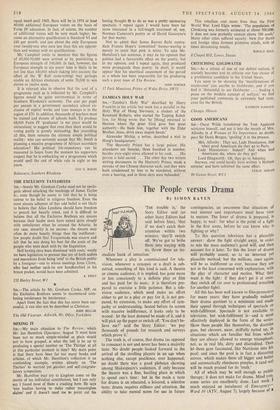MIXING IT Sts,—My main objection to The Review, which Mr.
Ian Hamilton (Spectator, August 7) must have been not so much simple-minded as plain stupid not to have grasped, is what the hell is he up to producing a special number on 'The Thirties' at all at this particular moment in time? My main point is that there have been far too many books and articles, of which Mr. Hamilton's collection is an outstanding example, written already on 'The Thirties' to warrant yet another and self-congratu- latory symposium.
Mr. Hamilton may cry to kingdom come on the merits of his individual contributors, but I can only say I found most of them a crashing bore. He says 'one loathes having to make rather meaningless claims' and it doesn't need me to point out his
having thought fit to do so was a pretty nauseating spectacle. I repeat again I would have been far more interested in a full-length treatment of, say, Norman Cameron's poetry or of David Gascoyne's for that matter.
Not to admit that James Reeves flatly contra- dicts Francis Hope's 'committed' banner-waving is merely to insist that pink is white. To take Mr. Hamilton's last sentence, it may be his opinion that politics had a favourable effect on the poetry, but in my opinion, and I repeat again, they produced more propaganda than poetry. In short, it would appear that his uncritical assessment of the period as a whole has been responsible for his producing such a poor issue of The Review.
JOHN HORDER
12 Park Mansions, Prince of Wales Drive, SW)]




























 Previous page
Previous page